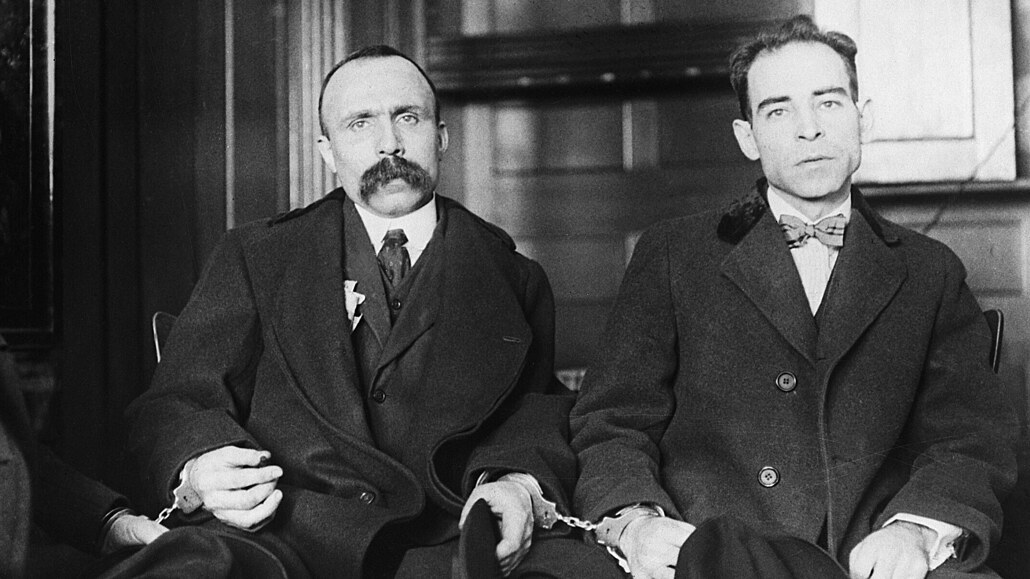By Sharon Oliver
Contributing Writer
BRAINTREE – When fish peddler Bartolomeo Vanzetti and shoemaker Nicola Sacco immigrated from their native Italy to the United States in 1908, it is hard to imagine them having ever envisioned themselves as the center of a landmark court case. After all, the Statue of Liberty (the “Mother of Exiles”) had welcomed them and other tired, poor, and huddled masses yearning to breathe free. Nevertheless, the pair would find themselves embroiled in a murder trial that received almost worldwide attention less than 20 years later and their freedom would be fleeting.

Photo/Wikimedia Commons
Shoe factory robbery
In 1920, Alessandro Berardelli, a guard, and Frederick Parmenter, a paymaster, were killed during an armed robbery of the Slater and Morrill Shoe Company in Braintree. Sacco and Vanzetti were accused, arrested, brought to trial, and convicted for the murders. Calls from academics and artists for their pardon or a new trial grew loud. Harvard law professor and future Supreme Court Justice Felix Frankfurter argued for their innocence in an Atlantic Monthly magazine article.
Four months before their execution in August 1927, 97 years ago this month, Vanzetti released a statement to the court:
“This is what I say: I would not wish to a dog or to a snake, to the most low and misfortunate creature of the earth—I would not wish to any of them what I have had to suffer for things that I am not guilty of. But my conviction is that I have suffered for things that I am guilty of. I am suffering because I am a radical and indeed I am a radical; I have suffered because I was an Italian, and indeed I am an Italian; I have suffered more for my family and for my beloved than for myself; but I am so convinced to be right that if you could execute me two times, and if I could be reborn two other times, I would live again to do what I have done already.”
Unrest and controversy
Shortly after the executions, the Massachusetts Judicial Council cited the Sacco and Vanzetti case as evidence of “serious defects in our methods of administering justice.” Protests erupted in the United States and Europe. As one act of retaliation, bombs exploded at American embassies all over the world including Paris, wounding the valet to the American ambassador. Reportedly, more than 10,000 mourners came to view the bodies of Bartolomeo and Sacco at Langone Funeral Home in Boston’s North End.
Crime boss Frank “Butsey” Morelli and his brothers were long suspected of being involved in the robbery and murders and in 1973, a former mobster published a confession by Frank’s brother Joe: “We whacked them out, we killed those guys in the robbery. These two greaseballs Sacco and Vanzetti took it on the chin.”
Opinions remain divided as to their guilt or innocence or if they were victims of a prejudiced legal system and a mishandled trial. Some believe Sacco was guilty, but that Vanzetti was innocent. Several historians believe the two men should have been granted a second trial given their trial’s significant defects. On the 50th anniversary of the deaths of Bartolomeo Vanzetti and Nicola Sacco, then-governor of Massachusetts, Michael Dukakis, issued a proclamation declaring the men had not been treated justly and that no stigma or disgrace should be associated with their names.
Despite the complex history of immigration, the nation was built on the backs of immigrants, descendants of immigrants, and slaves. Discussions and actions regarding immigration continue to be heated and divisive. There continues to be a heavy dose of tension and discrimination directed towards immigrants in some circles, some of whom are automatically targeted as criminals. Nearly a century later, the Sacco and Vanzetti case in Massachusetts continues to highlight issues of injustice, due process, and treatment of immigrants in the United States.
RELATED CONTENT:
Boston Strangler murders re-examined in new Hulu movie
Medford woman was victim of the ‘Black Dahlia’ unsolved murder
Rocker and art thief Myles Connor’s wild past immortalized in film












